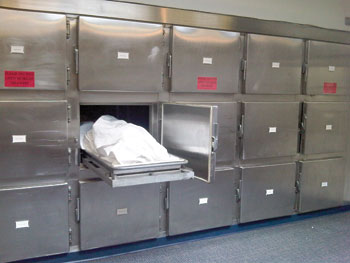Dealing with dead people is grim work but someone somewhere has got to do it! Emmanuel Asengweneza is a morgue attendant at Kibagabaga Hospital and he has worked at the morgue for three years. He told The NewTimes how it takes a lot of nerve to be a morgue attendant.


Dealing with dead people is grim work but someone somewhere has got to do it!
Emmanuel Asengweneza is a morgue attendant at Kibagabaga Hospital and he has worked at the morgue for three years. He told The NewTimes how it takes a lot of nerve to be a morgue attendant.
A morgue or mortuary is a place in a hospital or elsewhere used for the storage of human corpses awaiting identification, or removal for autopsy or disposal by burial, cremation or otherwise. In modern times they use refrigerators to delay decomposition.
"I got into the job because of unemployment. Though I have no children, I’ve got siblings I take care of and the only way I could take care of them, was to do anything available and my only opportunity arose at the mortuary,” Claude revealed.
"I remember my first day at work like it was only yesterday; I was helping my colleague to get the body of an old man out of the fridge, the corpse looked at me with wide open eyes and gaping mouth! I almost freaked out!
I managed to steady myself as the relatives of the deceased were in the adjacent room waiting. We washed the body, dressed it then put it in the coffin, that scene stayed with me for months,” recalls Asengweneza.
"Usually when somebody dies we are called in to carry the corpse to the morgue, sometimes the ambulance brings accident victims some of them disemboweled others with legs or arms cut off! As the morgue attendant, you have to put your fears aside and deal with the bodies,” he adds.
He said people are very superstitious of the mortuary.
"Some people believe that one must knock on the door of the mortuary before getting into the room in order to alert the spirits to take their positions. I do not believe in that. Rather, I believe in God,” he said.
Asengweneza said he is not afraid of dead people because the dead have no power.
"I like my job. There’s a sense of fulfillment when we see what we’ve done for the family by making their loved ones look as close as possible to how they remember them.”
He said his family know that he works in a bad place but are happy when he goes back home. Before joining this job, he said people told him stories like; "you will be slapped by a corpse, don’t go there.”
He said this scared him. But then there were no other means to take care of his family, and he also thought, "what of those who were already working there?” so he was forced to stay on.
To Asengweneza, working in the mortuary is like when somebody pays you and gives you a dress to take care of. Asked about working in the night, he said they work in shifts because there are some corpses, which are brought in the night and there are people who come in at midnight too, to take their corpses.
Asengweneza took us through different compartments inside the mortuary and showed us how corpses are kept. In the refrigerator section, there were about three corpses. The cost of keeping a corpse in the mortuary is Rwf10,000 per night.
D’mour, another morgue attendant who worked at the same hospital for three years did not have a different point of view from the other attendants. He said he believes that once somebody is dead, there is nothing to fear.
"The fact that people knock on the door of a mortuary before entering is merely superstition. We all do it but it is superstition,” D’mour said adding that, "He does not believe that corpses hold meetings to necessitate alerting them before entering a morgue.”
"For all the time I’ve worked as the morgue attendant, I haven’t encountered any creepy situation, but there are times when a person dies and the relatives fail to clear the hospital bills and decide to abandon the dead at the morgue, sometimes a husband will leave his dead wife or a wife her dead husband, it’s such a sad thing.
Otherwise, my work may not be the best in the world, but at least it pays the bills,” D’mour emphasized.


